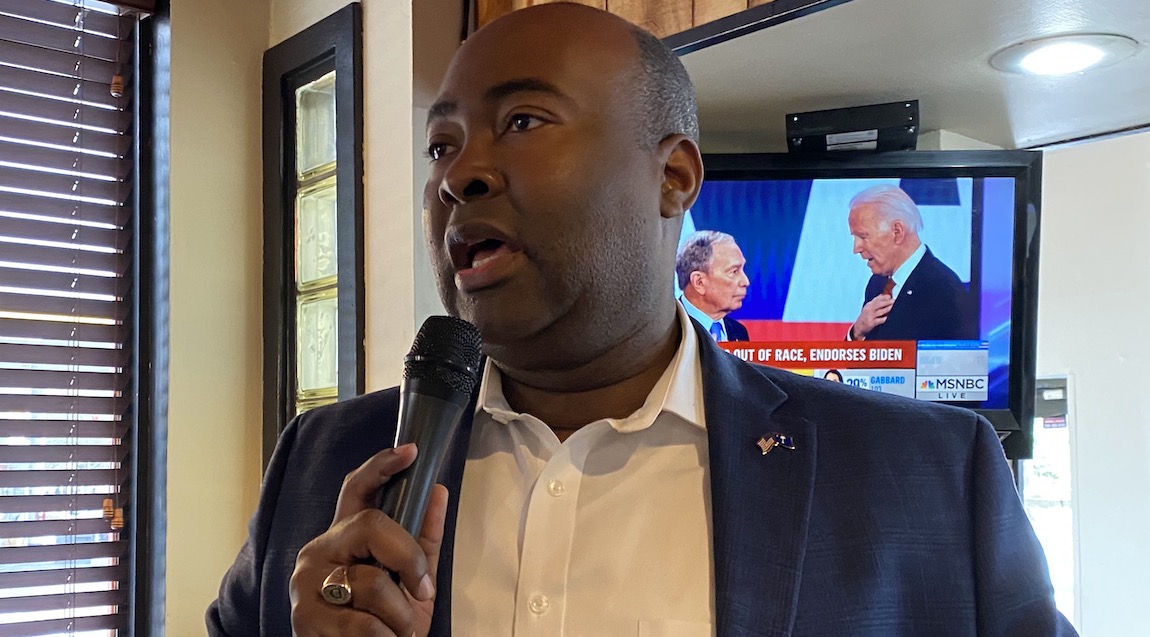Above Photo: Jamie Harrison speaks at Big Mike’s Soul Food Restaurant in Myrtle Beach – before the coronavirus struck.
By Bob Gatty
South Carolina’s Democratic US Senate candidate, Jamie Harrison, pledged to fight for legislation making voter suppression a federal crime if he is elected to succeed Sen. Lindsey Graham in November.
Harrison kicked off the HCDP-YDHC Voter-Candidate Primary Election Forums May 13, online events that will feature Democratic candidates through the election. While Harrison is unopposed in the Primary, other contested races will be featured in this series. The entire presentation can be seen here:
“When I am in the Senate, I want to make voter suppression a federal offense,” declared Harrison in the event that HCDP broadcast on Zoom. “I want to lock up any secretary of state that tries to deprive somebody of probably the most precious thing that we have as Americans, and that is our vote. Justice has to be just for all of us.”
The son of a single teenage mom, and raised by his grandparents in Orangeburg South Carolina, Jaime overcame the challenges of grinding poverty with the help of teachers and mentors who believed in him. From a mobile home to Yale University and Georgetown Law, Jaime now is running for U.S. Senate to fight for opportunity for all South Carolinians.
Battle for Fairness
“Not only am I going to represent black folks of South Carolina, I want to represent everybody,” Harrison said, noting that his opponent, Sen. Lindsey Graham, is interested only in representing only select segments of the population – the wealthy, connected and those who support him.
“I want to make sure everyone has a living wage,” said Harrison, pointing out that the current $7.25 minimum wage provides a poverty-level income.
“I really want to do my best to change the landscape here,” he added, noting that 300,000 people in South Carolina do not have health insurance simply because the Republican state administration has refused to except expansion of Medicaid provided by the Affordable Care Act. “They would be covered if they lived in any other state,” he said.
Harrison pointed out that numerous large companies have moved to South Carolina, attracted by the low wage base and low taxes, including financial incentives provided by the state. “But the high paying jobs at those companies are going to people who live in other states,” he said. “That is not right.”
Regarding education, Harrison said school curriculum needs to be modernized to provide skill sets for students who decide not to go to college, so they can graduate with a trade they can use to support themselves and their families.
Pointing out that many residents of Horry County do not have access to broadband, Harrison said that needs to change, and that broadband internet service should be as common as electricity coming into your house.
“We have a senator in South Carolina who’s been in there for 20 years, and he’s just starting to talk about Wi-Fi,” said Harrison. “He’s talking about Wi-Fi because I’m talking about Wi-Fi. That’s not good enough.” For children in South Carolina to learn and be on an equal footing with others, they must be connected to the outside world, he declared.
Overcoming Bigotry
Asked by Brandon Counts, vice chair of the Young Democrats of Horry County (YDHC) about his experiences growing up as a black man in the South, Harrison acknowledged the many challenges that confront him and other people of color, particularly young black men who all too often are perceived as a threat without cause.
He called on people of all races to join together to overcome bigotry.
“We all have to stand up,” he said. “If you are a good person in this country and you see things that are not right, it is incumbent that you stand up and say enough is enough. As a black person, I should not have to carry all of that weight. Not in America. We shouldn’t have to do it. It’s not fair for us to do that because we already carry the weight of being black each and every day.”
“It’s time for us to unify as a people and say enough is enough,” he stressed. “we have to stop this. We have to stop the target on black men. We have to stop the target on black women. We have to start treating each other the way we want people to treat us, because right now I can tell you that people in the African American community are not being treated (fairly).”
Harrison, the father of two black boys, said he must teach them to be wary “if a blue light comes up behind you because you don’t know how you’re going to be treated.”
Overcoming abject poverty to graduate from Yale University and Georgetown Law School, Harrison returned to Orangeburg to teach at his old high school, then served as a top aide to legendary South Carolina Rep. James Clyburn, where he was able to help shepherd key legislation through Congress.
Now, he wants to bring to the Senate that background, including the experience of growing up in a family that had to choose between paying the electric bill and putting food on the table, and to be a voice for everyone, not just the wealthy and the well-connected.
“How many people in the Senate do you think were ever on food stamps?” he asked.
No doubt, the answer is zero.
Caption:





